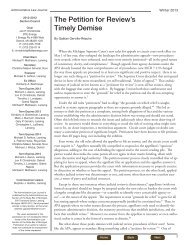目 录
TABLE OF CONTENTS - Warner Norcross & Judd LLP
TABLE OF CONTENTS - Warner Norcross & Judd LLP
- No tags were found...
You also want an ePaper? Increase the reach of your titles
YUMPU automatically turns print PDFs into web optimized ePapers that Google loves.
H Visas. A small number of H-1B visas are available each year for foreign nationals with a bachelor’s degree in aspecialized area of expertise who will be employed in that area. Application for H visas may be accepted only during ashort time period each year, which in some years may be no more than a few days long.Chinese companies who anticipate sending employees from China to the U.S. under the L visa program should considerconsulting with an attorney at least six months in advance regarding timing, requirements, and the appropriateness ofthe particular employee as an applicant. The lead time for an H or L visa, depending on individual circumstances, is 3 to12 months from the date of application for the approval notice.Legal Assistance for Visa Applicants. Although it is not required that visa applications be submitted by lawyers, business andcorporate visa applications are typically prepared and submitted by law firms due to the complexity of the application processand the experience that immigration specialists have in working with the relevant governmental authorities. Mistakes in thefiling process may significantly delay an approval or even result in the rejection of applications.Labor and EmploymentThe initial recruitment of local employees is among the first challenges a Chinese investor faces. Unless there areexisting relationships with local prospective employees, investors will commonly consult with recruiting agencies, whichtypically charge a fee for screening, arranging interviews and negotiating the placement of prospective employees. Forcertain positions, companies may use outsourced employees or staffing services for temporary assignments. Temporarystaffing is available for start-up companies that have uncertain human resources needs, but after a certain period of timethe staffing company may permit the company to hire the temporary employees permanently and directly for a fee.From a legal perspective, the U.S. labor market differs in several important ways from other markets. First, employment is generally “atwill,” which means that either the employer or employee may terminate the work arrangement with or without cause and with or withoutnotice. Exceptions to this general rule include: contractual stipulations which may provide for termination grounds; and anti-discriminatorylaws which regulate pre-employment activities and prohibit termination based on race, national origin, sex, maternal status and the like.Second, most U.S. employees rely to a much greater extent than their overseas counterparts on income fromemployment and work-linked benefits in areas like healthcare and supplementary pension savings. Government agenciesprovide income and health benefits only to those who are outside of the labor force, such as the unemployed.Doing business in MichiganHowever, employee benefits and working conditions are subject to regulations. While wages are often dictated bymarket forces, there is a federal minimum wage and a higher minimum wage may be required in some states and cities.Labor laws, such as the Fair Labor Standards Act, also regulate overtime pay, prohibit child labor and require equal payfor equal work regardless of gender. There are also mandatory benefits such as Social Security and Medicare.Certain employers provide fringe benefits to employees. Fringe benefits can include hospital and medical insurance,life insurance, disability insurance, paid leave and pension plans. Executives often participate in profit sharing and shareoption plans, which must comply with applicable laws if made available to employees.As to labor-management relations, the National Labor Relations Act guarantees the right to form unions and prohibits employersfrom dominating unions. If the majority of workers approve, the union is certified and becomes the official representative ofemployees for purposes of negotiating terms and conditions of employment. Union membership in the U.S. has been decliningfor years, both as a percentage of the work force and in absolute numbers. In Michigan, despite the reputation of unions in certainindustries, only 10% of non-government employees are unionized.21




